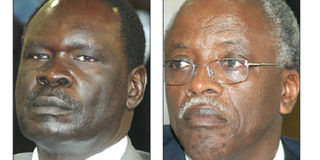Two ministers took bribe on oil deal, say leaked reports

Kampala
A leaked US diplomatic cable says Security Minister Amama Mbabazi and Energy Minister Hillary Onek took a bribe to support the botched sale of exploration and production rights by Heritage Oil Plc to Italian oil company ENI. In interviews with Saturday Monitor yesterday, both men denied the bribe claims. Mr Mbabazi said the allegations were false. He also said he had been made aware of the allegations by the Guardian newspaper in the UK. The minister sent a mailed response to the allegations (see response below ).
The meeting
The accusations were made by Tullow Oil’s Vice President for Africa Tim O’Hanlon at a December 14, 2009 meeting with the US Ambassador to Uganda Jerry Lanier. Following that meeting, a proposal was made to institute travel bans against the two government officials.
Mr O’Hanlon and Ambassador Lanier’s private conversations are the subject of the classified memo which was posted to Washington by Donald Cordell, Economic Officer at the US Mission in Kampala three days later, leaked by whistleblower website WikiLeaks.
At the meeting, Mr O’Hanlon reportedly told Ambassador Lanier that the effort by Heritage Oil and Gas to sell its stake to Eni through a December 18, 2009 deal “was apparently a corrupt back door deal”, aided by Mr Mbabazi and Mr Onek who got “compensated” for their support. He also noted that the deal would frustrate the entry of American oil giant, Exxon Mobil into the Ugandan oil sector.
No specific amounts of the alleged inducement are revealed. Neither do the cables give evidence that the claims are true. “O’Hanlon referred to Minister Mbabazi, who facilitated an August 2009 meeting between ENI and Tullow, as ENI’s ‘patron’ in Uganda, and said ENI created a shell company in London-TKL Holdings-through front men Mark Christian and Moses Seruje-to funnel money to Mbabazi,” the note reads in part.
According to the memo, Mr O’Hanlon noted what he described as Mr Onek’s “recent unsolicited grandstanding” before Parliament in support of ENI and similar statements of support he made at an energy conference in New Delhi, India, where the minister over stated ENI’s ability to export 100,000 to 200,000 barrels of oil per day within two years. “These statements of support by Onek appear completely inappropriate given that the deal is still technically pending,” the note said.
When contacted, Mr Onek vehemently denied the allegations. “The US government never contacted me so for them to go ahead and transmit false and unsubstantiated allegations is most unfortunate. The motive maybe to undermine or destroy the credibility of the individual but I don’t know for what reason. You must remember that Tullow was, at that time, bidding [to buy out Heritage] but you can’t believe these things because anyone can say anything about anyone without evidence,” he said.
Deal collapses
However, the Heritage-Eni deal collapsed less than three months after it was struck, following a decision by Tullow to exercise pre-emption rights as a 50 per cent partner with Heritage in Blocks 1 and 3A which were up for sale then.
Tullow eventually sunk $1.045b in cash to buy out Heritage’s assets in Uganda, in a deal that led to a long running tax battle between the government and Heritage over a $405million total tax claim.
American help
According to the memo, Mr O’Hanlon requested American assistance in ensuring the open and transparent sale of oil assets. “If Tullow’s allegations are true-and we believe they are-then this is a critical moment for Uganda’s nascent oil sector,” the note said. On his part, Ambassador Lanier is said to have described Tullow’s allegations as “very troubling signs of high-level corruption” in Uganda’s oil sector.
The US ambassador went on to propose “tough action” including travel bans “for senior officials like Mbabazi who are consistently linked to corruption scandals impacting the international activity of US business, US foreign assistance goals, and the stability of democratic institutions.”




